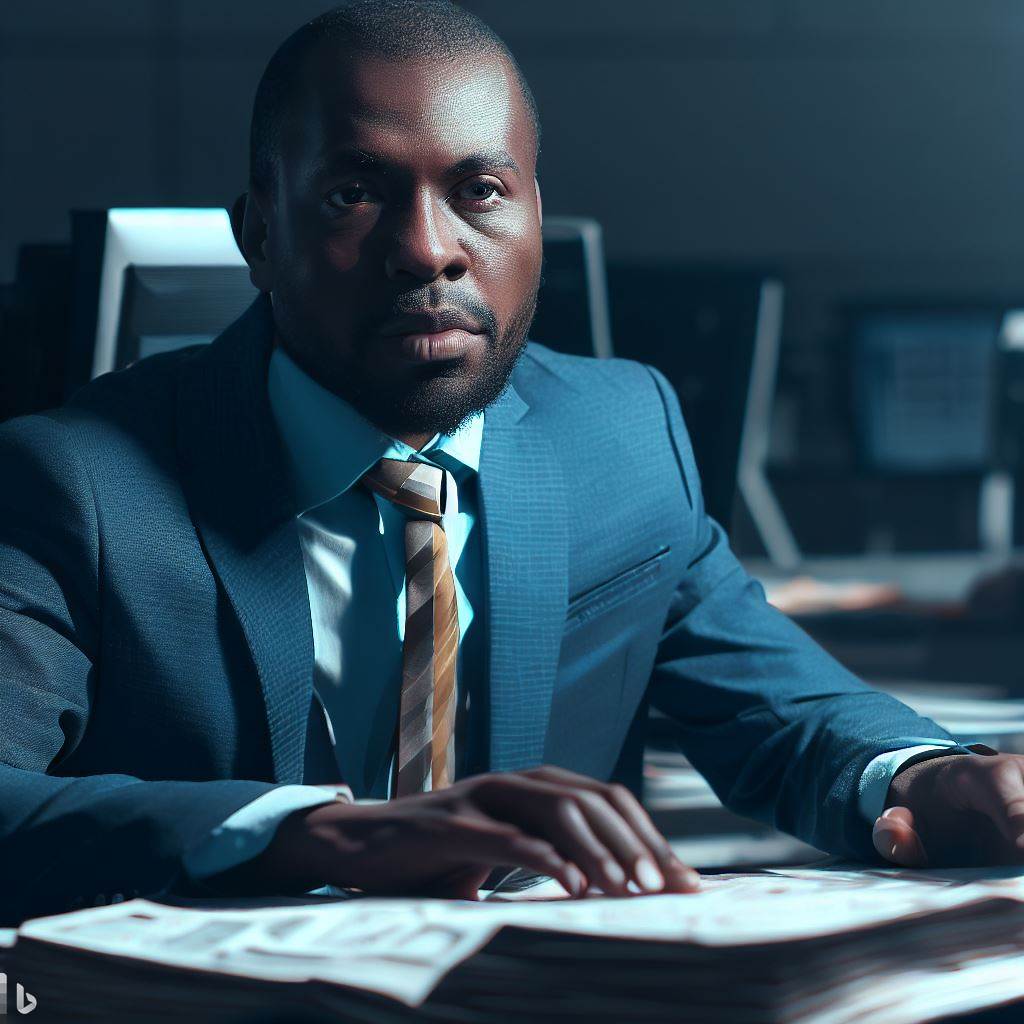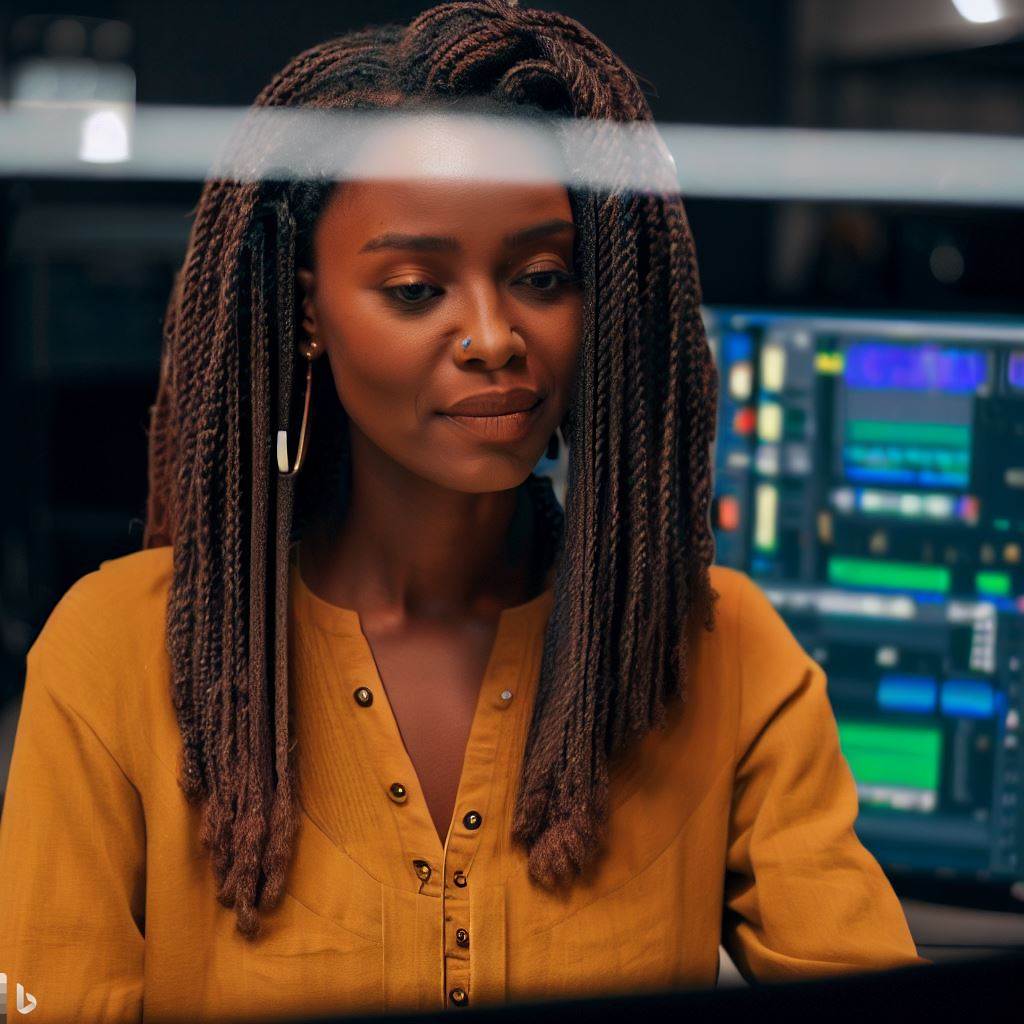Introduction
A. Brief overview of the topic
Nigerian editors play a crucial role in the journalism industry, ensuring quality and accuracy in news reporting.
They are responsible for the final editing process, making critical decisions on what gets published.
B. Significance of interviews with Nigerian editors
Interviews with Nigerian editors provide valuable insights into their profession, allowing readers to understand the challenges, skills, and experiences required for success in this field.
Such interviews also shed light on the unique and diverse perspectives of these professionals.
C. Thesis statement
This blog post aims to provide readers with insights into the profession of Nigerian editors through interviews with experienced professionals.
Interviews with Nigerian editors offer a unique vantage point, offering readers an understanding of the industry’s inner workings.
Through these interviews, readers will gain knowledge about the necessary skills, work dynamics, and challenges faced by Nigerian editors.
By conducting interviews with experienced professionals, this blog post seeks to offer real-life experiences and advice for aspiring Nigerian editors.
Understanding the intricacies and demands of the profession can assist individuals in making informed decisions and preparing themselves for a successful career in editing.
In the end, interviews with Nigerian editors are a valuable resource for gaining insights into the profession.
This blog post will delve deep into the experiences, challenges, and skills of these professionals, providing readers with a comprehensive understanding of Nigerian editors’ work.
Understanding the Role of Nigerian Editors
A. Definition and scope of the role
Nigerian editors play a crucial role in the publishing industry by ensuring the quality and accuracy of written materials.
They review, revise, and enhance content to make it suitable for publication and meet the target audience’s needs.
Editors collaborate closely with authors, publishers, and other stakeholders to shape and refine manuscripts.
B. Factors influencing the work of Nigerian editors
- Cultural context: The cultural context greatly impacts the work of Nigerian editors. They must understand and respect cultural nuances, values, and sensitivities.
- Language diversity: Nigeria is home to a rich linguistic landscape with over 500 languages. Editors must navigate this diversity and work with different language variations.
- Publishing industry: The publishing industry in Nigeria poses unique challenges and opportunities for editors. Limited resources, piracy, and distribution issues require their adapting skills and resourcefulness.
Read: Editors’ Contribution to Nigeria’s Literary Renaissance
Interview 1: Debo Adesina
A. Background information on the interviewed editor
Debo Adesina is a highly respected Nigerian editor with over 25 years of experience in the field. He is currently the editor-in-chief of a leading national newspaper.
B. Discussion on their journey into the profession
Debo Adesina’s journey into the world of editing started during his undergraduate years. He began writing for his university’s magazine and developed a love for storytelling and shaping narratives.
This passion led him to pursue a career in journalism and editing.
C. Challenges faced and how they were overcome
Adesina faced numerous challenges throughout his career, including tight deadlines, pressure from stakeholders, and staying up-to-date with rapidly changing technologies.
To overcome these challenges, he prioritized time management, built strong relationships with his team, and embraced continuous learning.
D. Insights into their responsibilities and tasks
As an editor-in-chief, Adesina’s responsibilities include overseeing the entire editorial process, ensuring the quality and accuracy of content, managing a team of journalists, and making strategic decisions to uphold the newspaper’s reputation.
His tasks involve editing articles, brainstorming story ideas, and guiding the overall direction of the publication.
E. Memorable experiences and accomplishments in the field
Adesina has had numerous memorable experiences throughout his career.
One of his proudest accomplishments was leading a team of journalists in exposing a major corruption scandal, which resulted in high-profile resignations and significant positive changes in the country.
He also fondly remembers the opportunity to interview influential figures and tell impactful stories that resonated with readers.
F. Words of advice for aspiring Nigerian editors
For aspiring Nigerian editors, Adesina advises building a strong foundation in journalism, developing excellent writing and editing skills, and staying curious about the world.
He emphasizes the importance of being adaptable in the face of changing technologies and encourages emerging editors to find their unique voice and storytelling style.
Debo Adesina’s interview offers valuable insights into the world of Nigerian editing. His journey, challenges, responsibilities, accomplishments, and advice serve as inspiration for aspiring editors.
Through his story, we see the dedication and passion required to excel in this demanding yet rewarding profession.
Read: Freelance Editing in Nigeria: Opportunities and Challenges
Interview 2: Martins Oloja
A. Background information on the interviewed editor
Martins Oloja is an accomplished Nigerian editor with over 20 years of experience in the industry.
He currently serves as the Editor-in-Chief of The Guardian Nigeria, one of the leading newspapers in the country.
B. Discussion on their path towards becoming an editor
Oloja’s journey towards becoming an editor started with his passion for writing and journalism.
He pursued a Bachelor’s degree in Mass Communication and later obtained a Master’s degree in Journalism.
After completing his education, Oloja began his career as a journalist, working his way up the ranks from a junior reporter to a senior correspondent.
His dedication, hard work, and commitment to excellence eventually led him to the editorial department.
C. Discussion on the unique challenges they have encountered
As an editor, Oloja has faced numerous challenges throughout his career.
One of the main challenges is the constant pressure to meet tight deadlines while ensuring the accuracy and quality of the newspaper’s content.
Additionally, Oloja often encounters resistance from individuals or groups who are not supportive of the newspaper’s investigative reporting and unbiased journalism.
Over the years, he has learned to navigate these challenges with resilience and professionalism.
D. Detailed overview of their work and day-to-day responsibilities
As the Editor-in-Chief of The Guardian Nigeria, Oloja is responsible for overseeing the entire editorial team and ensuring the newspaper maintains its high standards of reporting.
His day-to-day responsibilities include:
- Reviewing and editing articles
- Developing story ideas and assigning journalists to cover specific topics
- Collaborating with other departments such as advertising and design
- Monitoring the news cycle and making editorial decisions
- Conducting staff performance evaluations and providing feedback
E. Key achievements or projects they have worked on
Throughout his career, Oloja has achieved several notable accomplishments.
One of his key achievements was spearheading the digital transformation of The Guardian Nigeria, which led to increased online readership and engagement.
Furthermore, Oloja has been recognized for his commitment to journalistic integrity and excellence.
He has received numerous awards for his impactful investigative reporting and balanced coverage of important societal issues.
F. Advice for individuals considering a career in editing
For individuals considering a career in editing, Oloja offers the following advice:
- Develop strong writing and communication skills
- Stay updated with current affairs and trends
- Embrace challenges and learn from failures
- Build a network of industry professionals
- Continuously improve your editing skills through training and workshops
Oloja believes that editing is a fulfilling and rewarding profession for those who are passionate about storytelling and making a positive impact through journalism.
Read: The Role of Editors in Nigeria’s Publishing Industry

See Related Content: Behind the Scenes: A Day in a Nigerian Cinematographer’s Life
Interview 3: Abimbola Adelakun
A. Background information on the interviewed editor
Abimbola Adelakun is a renowned Nigerian editor who has gained a reputation for her exceptional editing skills and insightful contributions to the field.
With several years of experience under her belt, Adelakun is widely respected in the editing community.
B. Insight into their educational background and professional journey
Adelakun obtained a Bachelor’s degree in English from the prestigious University of Lagos.
After completing her undergraduate studies, she pursued a Master’s degree in Editing and Publishing from a renowned university in the United Kingdom.
Her educational background equipped her with the necessary knowledge and skills to excel in the editing profession.
C. Discussion on the evolving nature of editing in Nigeria
According to Adelakun, the editing landscape in Nigeria has undergone significant changes over the years.
Technology has played a crucial role in shaping the industry, with editors now having to adapt to digital platforms and online content.
Additionally, the demand for editing services has increased, reflecting a growing recognition of the importance of polished, error-free content.
D. Challenges faced and innovative approaches taken
As an editor in Nigeria, Adelakun has faced various challenges, including tight deadlines, limited resources, and a lack of awareness about the value of editing.
However, she has adopted innovative approaches to overcome these obstacles. For instance, she has leveraged social media platforms to promote the importance of editing and educate aspiring editors.
E. Thoughts on the future of editing in Nigeria
Adelakun believes that the future of editing in Nigeria is promising. With the increasing emphasis on quality content in both traditional and digital media, the demand for skilled editors is expected to rise.
She also highlights the importance of continuous professional development and staying up-to-date with industry trends to thrive in this evolving profession.
F. Recommendations for those interested in pursuing editing as a profession
- Develop a strong command of the language and grammar skills through continued practice and learning.
- Obtain relevant educational qualifications, such as a degree in English or a related field, to gain a solid foundation in language and literature.
- Seek opportunities for hands-on experience through internships or freelance work to sharpen editing skills.
- Stay updated with the latest industry trends, technologies, and editing techniques through workshops, seminars, and professional development programs.
- Build a network of professionals in the editing field to learn from their experiences and gain valuable insights.
- Embrace technology and adapt to the changing landscape of editing, including digital platforms and online content.
- Market yourself by showcasing your skills and expertise through a strong online presence, including a professional website and active social media profiles.
Read: Book vs. Film Editing in Nigeria: A Comparative Analysis
Common Themes and Insights
A. Common challenges faced by Nigerian editors
- Lack of resources and funding affects the quality of editing in Nigerian publications.
- Limited access to training opportunities and professional development hinders the growth of editors.
- Dealing with tight deadlines and managing multiple tasks simultaneously is a constant challenge.
- Maintaining editorial independence and avoiding external influences can be difficult in Nigeria’s media landscape.
- Struggling with plagiarism and unethical practices, as well as ensuring accurate fact-checking, are ongoing concerns.
B. Key skills and qualities required for success in the profession
- Proficiency in grammar, spelling, punctuation, and style is essential for a Nigerian editor.
- Strong communication skills, both written and verbal, are crucial for effective collaboration with writers, journalists, and other team members.
- Attention to detail and a meticulous approach to editing ensure error-free and high-quality content.
- Adaptability and the ability to handle feedback and criticism positively are important traits for Nigerian editors.
- Time management and organizational skills help editors meet deadlines and manage multiple projects efficiently.
C. The role of technology and its impact on editing
- Technology has revolutionized the editing process, providing tools for grammar and spell-checking, formatting, and document collaboration.
- The use of editing software and online platforms has increased efficiency and streamlined the editing workflow.
- Electronic publishing has made content more accessible, but it has also created challenges in maintaining accuracy and credibility.
- Nigerian editors must adapt to evolving technological advancements to stay relevant and meet the demands of the digital age.
- Technology has facilitated the globalization of editing, enabling Nigerian editors to work remotely and collaborate with clients worldwide.
Overall, Nigerian editors face common challenges such as limited resources, training opportunities, and ethical dilemmas.
However, the profession requires key skills like proficiency in language, communication, attention to detail, adaptability, and time management.
Technology plays a significant role in transforming the editing process, offering both advantages and challenges that editors need to navigate successfully.
By recognizing these common themes and insights, Nigerian editors can better navigate their profession and strive for excellence in their work.
Find Out More: Influence of Afrobeat on Nigerian Music Artists
Learn More: The Role of Journalists in Nigeria’s Election Coverage
Conclusion
Recap of the main points discussed in the blog post
In this blog post, we have delved into the world of Nigerian editors and gained valuable insights from interviews with professionals in the field.
We explored their roles, challenges, and unique perspectives on editing.
Reinforcement of the importance of interviews with Nigerian editors
These interviews have shed light on the significance of engaging with Nigerian editors to understand the intricacies of the profession.
Their experiences have highlighted the crucial role editors play in shaping written content and maintaining quality standards.
Implications for individuals interested in pursuing a career in editing
For aspiring editors in Nigeria, these interviews serve as eye-opening accounts of the profession’s demands and rewards.
They provide guidance on the necessary skills, such as attention to detail, subject knowledge, and effective communication, to succeed in this field.
Closing thoughts and encouragement to explore the profession further
As we conclude this blog post, we encourage individuals intrigued by the world of editing to delve deeper into its intricacies.
This profession offers endless opportunities to make a significant impact through refining written works, captivating readers, and ensuring effective communication.
Embark on the journey of discovering the nuances of the editing profession – a profession that holds immense power over the written word.




